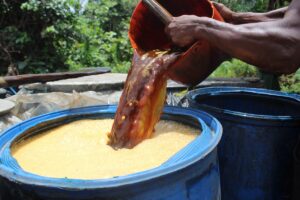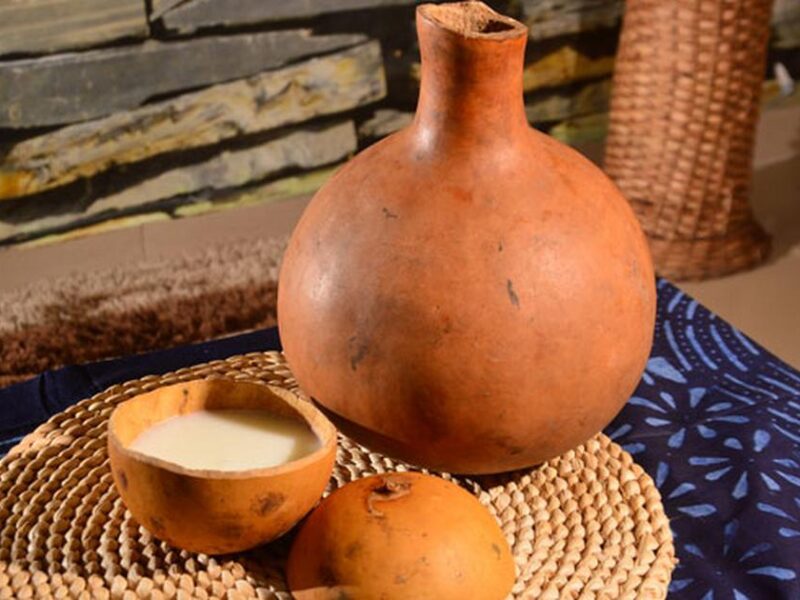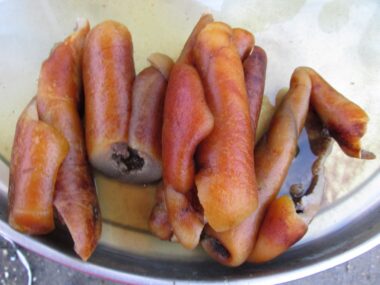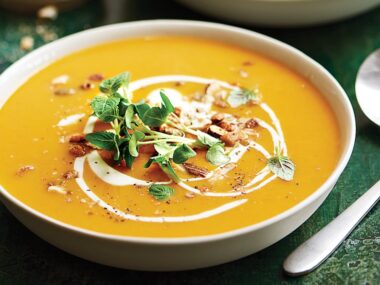Introduction: Nigeria, with its diverse cultures and rich culinary heritage, offers a plethora of traditional drinks and beverages that are not only delicious but also deeply rooted in cultural significance. From the fermented delights of palm wine to the refreshing tartness of zobo and the nutritious goodness of kunu, to the vibrant and festive Chapman cocktail, Nigerian beverages are a testament to the country’s vibrant food culture. In this exploration, we delve into the history, preparation methods, flavors, and cultural significance of some of Nigeria’s most beloved drinks.
Section 1: Palm Wine Palm wine, often referred to as “the sap of life,” holds a special place in Nigerian culture, cherished for its unique taste and communal significance. Here’s a closer look at this iconic beverage:

1.1. Origins and Harvesting:
- Palm wine, known locally as “ememu” or “ogogoro,” has been consumed in Nigeria for centuries, with evidence of its consumption dating back to ancient times.
- The sap is extracted from various species of palm trees, including the oil palm and raffia palm, through a process called tapping. Tappers climb the trees to make incisions in the palm’s flower clusters, allowing the sap to flow into collection containers.
1.2. Fermentation and Flavor:
- Once collected, the sap undergoes natural fermentation due to the presence of wild yeast in the air. The fermentation process gives palm wine its distinctive flavor profile, which can range from mildly sweet to tangy and slightly sour, depending on factors such as the type of palm tree, the duration of fermentation, and environmental conditions.
- Palm wine is typically consumed fresh, as it tends to spoil quickly once exposed to air. However, it can also be further fermented to produce stronger alcoholic beverages like “ogogoro,” a potent distilled spirit.
1.3. Cultural Significance:
- Palm wine holds deep cultural significance in Nigerian society, often serving as a symbol of hospitality, friendship, and communal bonding. It is traditionally offered to guests as a sign of welcome and respect during social gatherings, celebrations, and rites of passage such as weddings, festivals, and funerals.
- In some Nigerian cultures, palm wine is also used in traditional rituals and ceremonies to appease ancestors, seek blessings, and mark significant life events.
Section 2: Zobo Zobo, a refreshing and tangy beverage made from dried hibiscus flowers, is a staple of Nigerian cuisine, particularly during festive occasions and hot weather. Here’s a closer look at this vibrant drink:
2.1. Preparation and Ingredients:
- Zobo is prepared by steeping dried hibiscus flowers, known locally as “sorrel” or “roselle,” in hot water, along with spices such as ginger, cloves, and sometimes cinnamon or pineapple peel for added flavor.
- The mixture is allowed to infuse for several hours or overnight, during which time the vibrant red color and tart flavor of the hibiscus flowers impart their essence to the liquid.
- After steeping, the mixture is strained to remove the flowers, and sweeteners such as sugar or honey are added to taste, along with additional flavorings if desired.
2.2. Flavor Profile and Variations:
- Zobo has a tangy and slightly tart flavor, with floral and citrus notes from the hibiscus flowers and a subtle warmth from the ginger and cloves.
- While the basic recipe remains consistent, there are countless variations of zobo across Nigeria, with each region and household adding its unique twist with additional ingredients like pineapple, orange peel, mint leaves, or even tamarind for a more complex flavor profile.
2.3. Cultural Significance:
- Zobo is more than just a beverage; it is a cultural institution in Nigeria, particularly during festive occasions such as weddings, parties, and religious celebrations like Eid and Christmas.
- The vibrant red color of zobo symbolizes vitality, prosperity, and celebration, making it a fitting choice for joyous occasions and communal gatherings.
Section 3: Kunu Kunu, a traditional Nigerian beverage made from grains such as millet, sorghum, or maize, is cherished for its nutritional value, earthy flavor, and versatility. Here’s a closer look at this wholesome drink:
3.1. Ingredients and Preparation:
- Kunu is typically made by soaking whole grains in water for several hours or overnight to soften them, then grinding them into a smooth paste or flour.
- The ground grains are mixed with water to form a thick slurry, which is then strained to remove any solids, resulting in a smooth and creamy liquid.
- The liquid is then sweetened with sugar or honey to taste and flavored with spices such as ginger, cloves, or sometimes tamarind for added depth of flavor.
3.2. Flavor Profile and Varieties:
- Kunu has a distinctive nutty flavor with earthy undertones, reminiscent of the grains from which it is made. It has a slightly sour note, which adds complexity to its flavor profile.
- While millet and sorghum are the most common grains used to make kunu, variations can be found across Nigeria, with some regions incorporating additional ingredients like rice, guinea corn, or even tiger nuts for a richer and creamier texture.
3.3. Nutritional Benefits:
- Kunu is prized for its nutritional value, serving as a rich source of carbohydrates, proteins, vitamins, and minerals. It is particularly popular during Ramadan fasting periods as a nutritious and hydrating beverage for breaking the fast.
- The drink’s high fiber content makes it an excellent aid in digestion and gut health, while its energy-boosting properties make it a favorite among laborers and athletes alike.
Section 4: Chapman Chapman, a vibrant and festive cocktail named after a British naval officer, is a beloved beverage in Nigeria, cherished for its colorful presentation, fruity flavor, and refreshing taste. Here’s a closer look at this iconic Nigerian drink:
4.1. Origins and Ingredients:
- Chapman is believed to have originated in Nigeria in the mid-20th century and is named after Arthur Chapman, a British officer who served in Nigeria during the colonial era.
- The drink typically consists of a mix of non-alcoholic ingredients, including Fanta or Sprite (or a combination of both), Angostura aromatic bitters, grenadine syrup, lemon-lime soda, and sometimes blackcurrant cordial or cucumber slices for garnish.
- The exact recipe may vary depending on personal preference and regional variations, with some recipes incorporating additional ingredients like orange or pineapple juice for added sweetness and complexity.
4.2. Flavor Profile and Presentation:
- Chapman is renowned for its vibrant color palette, featuring hues of red, orange, and yellow that evoke the colors of the Nigerian flag.
- The drink has a sweet and tangy flavor profile, with fruity notes from the carbonated soda and grenadine syrup, balanced by the bitterness of the bitters and the refreshing zest of the citrus garnish.
- Chapman is typically served in a tall glass filled with ice and garnished with slices of citrus fruit, cucumber, or maraschino cherries for a visually stunning presentation that adds to its festive appeal.
4.3. Cultural Significance:
- Chapman holds a special place in Nigerian culture as a celebratory beverage, often enjoyed during social gatherings, parties, and special occasions such as weddings, birthdays, and holidays.
- Its vibrant colors and refreshing taste make it a popular choice for toasting and raising a glass in celebration, symbolizing joy, camaraderie, and the spirit of hospitality that defines Nigerian culture.
Conclusion: Traditional Nigerian drinks and beverages offer a tantalizing glimpse into the country’s rich culinary heritage, vibrant flavors, and cultural traditions. Whether it’s the earthy richness of palm wine, the tangy tartness of zobo, the wholesome goodness of kunu, or the festive cheer of Chapman, each beverage tells a story of tradition, community, and shared enjoyment. So, whether you’re sipping on palm wine under the shade of a palm tree, cooling off with a glass of zobo on a hot afternoon, or raising a toast with a vibrant Chapman cocktail at a festive celebration, take a moment to savor the flavors and appreciate the cultural richness of Nigerian beverages.










